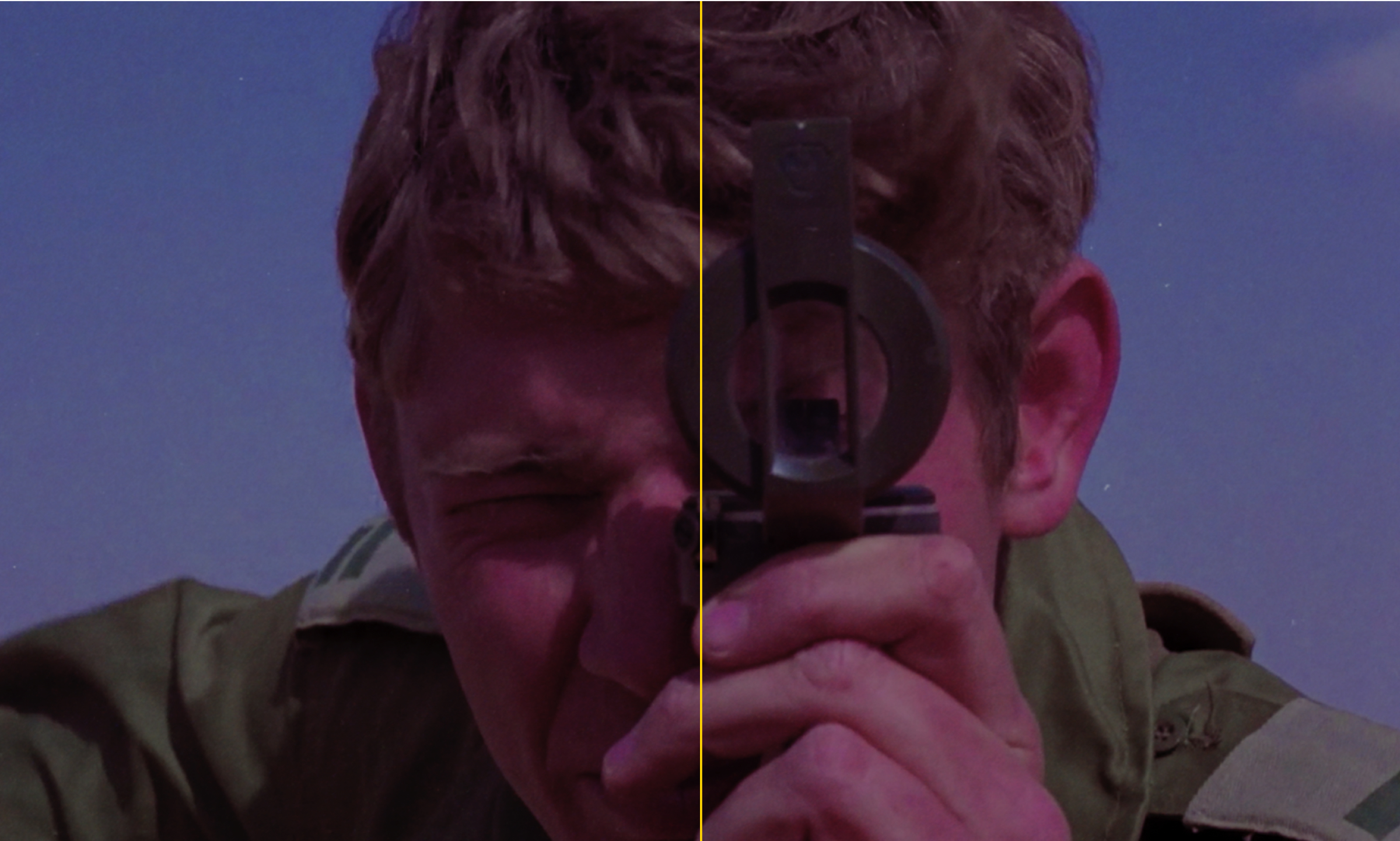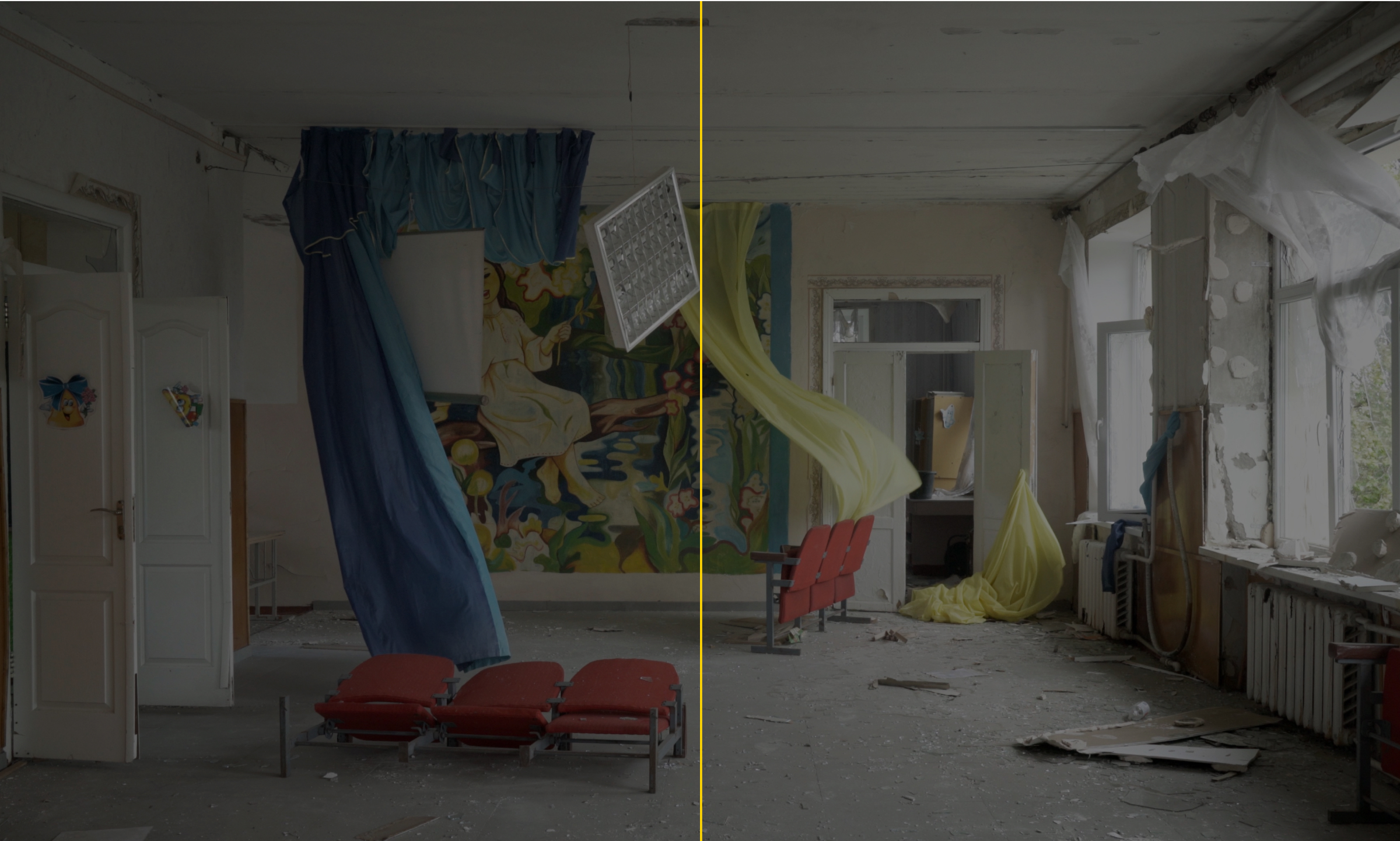Saturday, October 19
︎ 18:00-21:00
︎ Cinema at MAC Birmingham
PARADISO, XXXI, 108 by Kamal Aljafari (18 mins)
INTERCEPTED by Oksana Karpovych (95 mins)
+ Q&A (60 mins)
+ pre-screening reception (17:00-18:00)
︎ Tickets
︎ 18:00-21:00
︎ Cinema at MAC Birmingham
PALESTINIAN-UKRAINIAN SOLIDARITY SCREENING 2: SCRUTINISING THE ENEMY
PARADISO, XXXI, 108 by Kamal Aljafari (18 mins)
INTERCEPTED by Oksana Karpovych (95 mins)
+ Q&A (60 mins)
+ pre-screening reception (17:00-18:00)
︎ Tickets
Screening Rights Film Festival is bringing the latest socially engaged and formally innovative cinema from the Global South to audiences in the West Midlands. The centrepiece of its 10th-anniversary edition, subtitled DOUBLE BILL, consists of two Palestinian-Ukrainian solidarity screenings designed to complement one another. The second of these, featuring Kamal Aljafari’s Paradiso, XXXI, 108 and Oksana Karpovych’s Intercepted, is ingenious reclaiming of the russian and “israeli” military propaganda. Based on a simple premise — putting the enemy front and centre — both films demystify the logic (or lack thereof) and functioning (or rather dysfunctioning) of imperial regimes with stark clarity, without losing an ounce of humanity.
Book your tickets for the first screening, featuring Lamees Almakkawy’s Dancing Palestine and Marta Hryniuk’s and Nick Thomas’s Weightless, here.
Book your tickets for the first screening, featuring Lamees Almakkawy’s Dancing Palestine and Marta Hryniuk’s and Nick Thomas’s Weightless, here.

PARADISO, XXXI, 108
Kamal Aljafari / 2022 / Germany, State of Palestine / 18’ / Hebrew with English subtitles
Already renowned for his work with archives, Palestinian filmmaker Kamal Aljafari takes this engagement to a new level in the subtly sarcastic short Paradiso, XXXI, 108. Through the recontextualised images of military training and explosions, appropriated from the “israeli” state propaganda, Aljafari exposes the occupation army’s obsession with weaponry, masculinity, and the gamification of war. The fact that the film does not feature a single Palestinian person highlights the ongoing dehumanisation of Palestinians in the eyes of the death cult that is the zionist entity.
Kamal Aljafari is a Palestinian filmmaker based in Berlin. He works with moving and still images, interweaving between fiction, non-fiction, and art.

INTERCEPTED
Oksana Karpovych / 2024 / Canada, France, Ukraine / 95’ / Russian, Ukrainian with English subtitles
Similarly to her full-length documentary debut, Don’t Worry, The Doors Will Open, shot on elektrychkas — the local trains that Ukrainians use to commute between large cities and smaller towns — Oksana Karpovych’s highly acclaimed Intercepted consists of oral testimonies. This time around, however, these belong not to Ukrainian commuters but to russian occupiers in Ukraine during the full-scale invasion, who are having phone conversations with their families back home. Intercepted and recorded by the Ukrainian military, these calls expose russians as fundamentally demoralised and often clueless as to the reasons for their presence in Ukraine. Soldiers openly confess to the worst war crimes, while their families encourage them to steal yet another household appliance. Through a simple yet overwhelmingly effective juxtaposition of harrowing audio recordings with the devastated natural and urban landscapes of Ukraine, the film names and shames the aggressor, all the while humanising those to whom it is dedicated: “ordinary Ukrainians, who fearlessly resist the imperialist russian machine.”
Oksana Karpovych is a Ukrainian filmmaker based in Montreal. In her projects Karpovych explores everyday lives of the common people and how the state politics invades the personal sphere and the influence it has on the communities she intimately documents.
The screening will be accompanied by a panel discussion, moderated by Belal Stitan (co-founer of Eurorelief, a charity delivering aid to Gaza) and featuring Abla Kandalaft (film programmer at the Garden Cinema, London) and guest curator, Ukrainian author Misha Honcharenko. The screening will be preceded by a reception (17:00-18:00), featuring traditional food from the Ukrainian Sunflower and Bayt Al-Yemeni.
CONTENT WARNING: Please note that both films feature images and explicit audio descriptions of war and war crimes. Intercepted features Russian language, which may be triggering to some, including obscenities and language that denigrates Ukrainian people.
CINEMATIC CONFRONTATIONS AND IMPERIAL ARCHIVES:
PABLO ALVAREZ RESPONDS TO KAMAL ALJAFARI’S PARADISO, XXXI, 108
GUEST CURATOR’S BIO
Pablo Alvarez is an independent researcher and film worker with an interest in the relationship between cinema, history, human rights, and social change. He is the co-director of Falasteen on Film, a community cinema showcasing Palestinian films in Birmingham, and also serves as a coordinator at Screening Rights.
PABLO ALVAREZ RESPONDS TO KAMAL ALJAFARI’S PARADISO, XXXI, 108
By re-ordering the footage or replacing the voiceover narration with elegiac classical music, the film creates an almost burlesque and absurd narrative of the already picturesque depictions of the IDF. Through this playful editing, Aljafari poses serious questions regarding the status of war images. “Was then Your image like the image I see now?” wonders the pilgrim contemplating the imprint of Christ’s face on the Veil of Veronica in Paradiso, the passage from Dante’s Divine Comedy that gives the title to Aljafari’s short film and is also referenced in a short story by Borges. Like Dante’s Paradiso, Aljafari’s film interrogates the reality of the image fabricated by the IDF in these fictional films. Read the full response︎
GUEST CURATOR’S BIO
Pablo Alvarez is an independent researcher and film worker with an interest in the relationship between cinema, history, human rights, and social change. He is the co-director of Falasteen on Film, a community cinema showcasing Palestinian films in Birmingham, and also serves as a coordinator at Screening Rights.
THE VIOLENCE OF SPEECH:
MISHA HONCHARENKO RESPONDS TO OKSANA KARPOVYCH’S INTERCEPTED
The film captures quiet moments that build up into an eerie unease — none of this is fabricated. It’s non-fiction, and life is much scarier than you imagine. It crawled under my skin, into my bones. True art should never make excuses in relation to reality. Never. The film's gaps and silences feel like black holes on a road. Read the full response︎
GUEST CURATOR’S BIO
Misha Honcharenko is a queer Ukrainian artist and writer. He started diarising his experiences on his Instagram profile almost a decade ago, combining weird objects and landscapes with a photographic exploration of himself, all against the backdrop of the russian invasion.
MISHA HONCHARENKO RESPONDS TO OKSANA KARPOVYCH’S INTERCEPTED
The film captures quiet moments that build up into an eerie unease — none of this is fabricated. It’s non-fiction, and life is much scarier than you imagine. It crawled under my skin, into my bones. True art should never make excuses in relation to reality. Never. The film's gaps and silences feel like black holes on a road. Read the full response︎
GUEST CURATOR’S BIO
Misha Honcharenko is a queer Ukrainian artist and writer. He started diarising his experiences on his Instagram profile almost a decade ago, combining weird objects and landscapes with a photographic exploration of himself, all against the backdrop of the russian invasion.